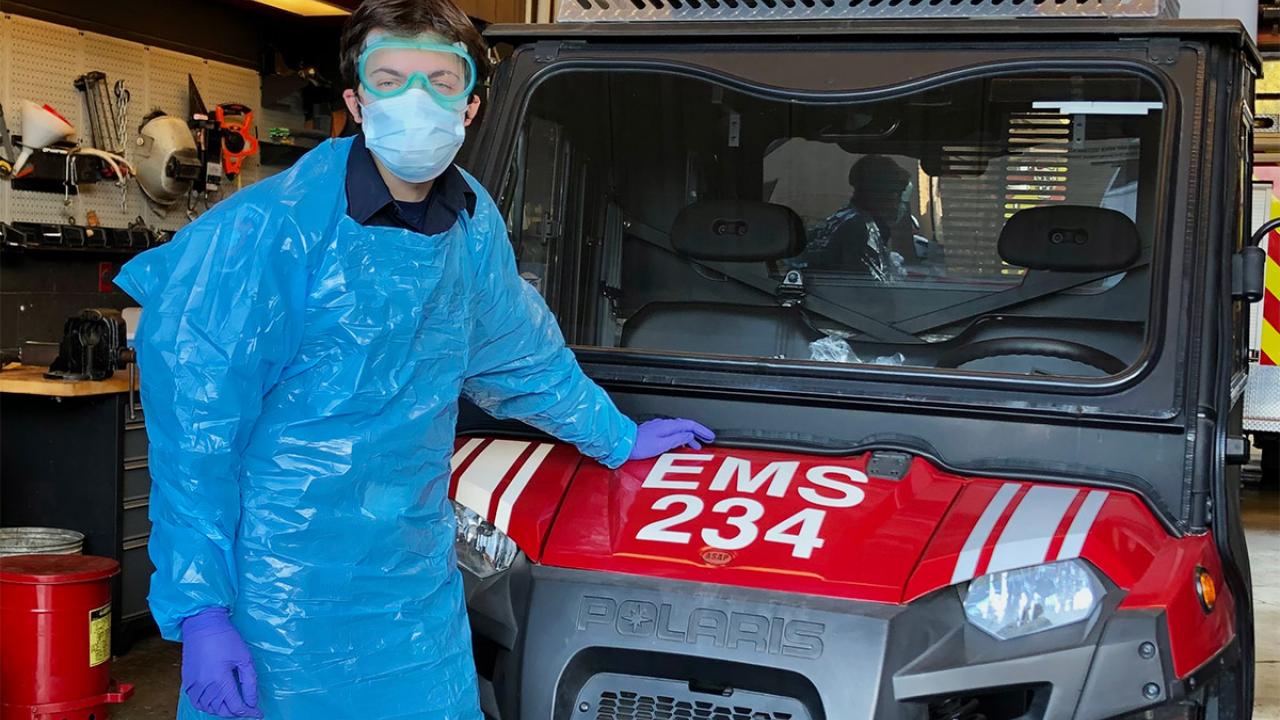Student EMTs are helping their fellow students move safely into on-campus quarantine, thanks to a collaboration between the UC Davis Fire Department, Student Health and Counseling Services and Student Housing.
If a student who lives in on-campus, shared housing tests positive for COVID-19 or is a close contact of someone who has tested positive, they are required to move into a space in which they can successfully quarantine or isolate. For those who need to relocate and are remaining on-campus, they are moved a separate apartment for the duration of their quarantine or isolation, usually 10 days.
“A lot of people come to campus without cars, without transportation,” said Fire Chief Nate Trauernicht. “How do you take these folks who need to take their personal belongings and how do you safely get them there without them asking a friend and exposing a friend?”
SUPPORTING VACCINE EFFORTS
 Student EMT Matt Kenaston at a vaccination event last week. (UC Davis Fire Department)
Student EMT Matt Kenaston at a vaccination event last week. (UC Davis Fire Department)
UC Davis’ student EMTs spent three days on the front lines of Yolo County’s efforts to roll out the COVID-19 vaccine to first responders last week. As firefighters, paramedics and EMTs arrived at the event, student EMTs greeted and directed them, also provided other support. Regional fire chiefs, including Trauernicht, also posed for a photo to encourage members of the public to get vaccinated once they are able.
The solution is the department’s EMS 234, a small, six-wheeled utility vehicle normally used to staff large events like football games. It’s been outfitted with modifications like extra partitions, and on Jan. 5 was used for the first time to pick up two students headed to quarantine. Students received special instructions before the trip on how to enter and exit the back of the vehicle, where an EMT and cot would usually sit. A student EMT, outfitted in full PPE, drives but doesn’t come into contact with the passenger.
Cindy Schorzman, medical director of Student Health and Counseling Services, said making the quarantine process easier for students can make them more likely to successfully complete it.
“We often reach out to students in need of quarantine or isolation who can't effectively isolate or quarantine in their own space but do not have transportation,” she said. “Helping them transport themselves and their essential belongings to their quarantine/isolation space helps set the tone for a good experience, and in some cases makes the difference between whether they can effectively move into this space at all.”
As of today (Jan. 11), there were 84 students quarantining in campus apartments after positive tests or exposure.
Branden Petitt, director of the Office of Student Development in Student Housing and Dining Services, said transportation makes the process “more seamless.”
“Anything we can do to make the student comfortable while they isolate and continue with their studies only helps in preventing the spread of this virus,” he said.
Officials are now exploring the possibility of expanding the service to students who live off-campus.
